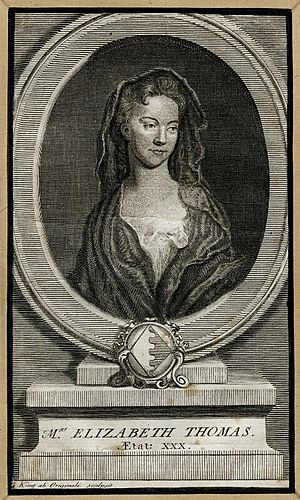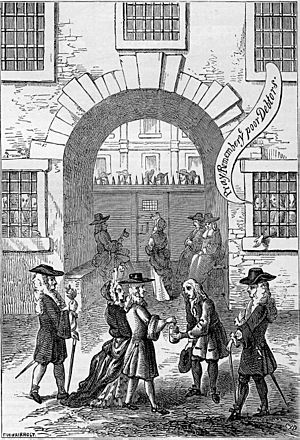Elizabeth Thomas (poet, born 1675) facts for kids
Quick facts for kids
Elizabeth Thomas
|
|
|---|---|

Engraved portrait of Elizabeth Thomas by Giles King, circa 1730s. National Portrait Gallery, London.
|
|
| Born | 31 August 1675 London |
| Died | 3 February 1731 (aged 55) London |
| Resting place | St Bride's, Fleet Street |
| Pen name | Corinna; Eliza; a young lady |
| Occupation | Poet and letter-writer |
| Language | English |
| Notable work | Metamorphosis of the Town" (1730) |
|
|
|
Elizabeth Thomas (1675 – 1731) was a talented British poet and writer of letters. She was part of an important group of artists and writers in London. The famous poet John Dryden even called her "Corinna." However, she often struggled with money and health problems. Her reputation was sadly hurt by another famous writer, Alexander Pope. Near the end of her life, she spent three years in a special prison for people who couldn't pay their debts.
Contents
The Life of Elizabeth Thomas
Her Early Life
Elizabeth Thomas was born in London in 1675. She was the only child of Elizabeth Osborne and Emmanuel Thomas. Her father was a lawyer, but he passed away when Elizabeth was just a baby. Her mother, Elizabeth Osborne, was only 16 years old when Elizabeth was born.
After her father's death, Elizabeth and her mother faced many money problems. They lived in Surrey for a while, then moved back to London. They settled in Great Russel Street. Elizabeth was taught at home. She read many books and learned some French and Latin.
Becoming a Writer
By her mid-twenties, Elizabeth Thomas was a confident poet. She shared her poems with other writers of her time. She came from a good family but had little money. This meant she needed support from others to continue her writing.
She was lucky to be part of a famous group of artists and writers. This group included Mary Chudleigh, Mary Astell, and Mary Wortley Montagu. She also knew the painter Sarah Hoadly.
Elizabeth sent two poems to John Dryden shortly before he died. He was very impressed. He even compared her to the famous poet Katherine Philips. At her request, Dryden gave her a special pen name: "Corinna." Her first known published work was a poem about Dryden's death. It appeared in a collection called Luctus Britannici in 1700.
A Long Engagement
Elizabeth Thomas was engaged for 16 years to Richard Gwinnett (1675–1717). They could not get married because they did not have enough money. In 1716, Gwinnett finally received an inheritance. This meant they could now afford to marry.
However, Elizabeth decided to delay the wedding. She wanted to care for her mother, who was very ill. Sadly, Gwinnett died the next year from a lung disease. He had left money for Elizabeth in his will. But his family tried to hide the will.
Elizabeth went to court to get the money. She won the case, but she could not pay her legal fees. During their long engagement, Elizabeth and Richard wrote many letters to each other. Many of these letters were published after Elizabeth's death. They appeared in books like Pylades and Corinna (1731–2).
Her Poetic Themes
Elizabeth Thomas was well-known in London and Bath for her writing. She tried many different types of poetry. These included songs, praises, and religious poems. She also wrote satires, which are works that use humor to criticize people or ideas.
Much of her poetry focused on issues important to women. She often wrote about women's right to education. In her time, women were "still deny'd th'Improvement of our Mind." In one poem from 1722, she wrote about a man who said her books would make her crazy. She argued that men who denied women learning were selfish. They feared women would become too smart.
Her poems first passed around as handwritten copies. But because she needed money, she started publishing her work. Her book Miscellany Poems on Several Subjects was published in 1722.
Her Reputation and Challenges
A friend named Henry Cromwell once gave Elizabeth some letters he had received from a young Alexander Pope. In 1726, Elizabeth needed money. She sold these letters to a publisher named Edmund Curll. Curll quickly published the letters. This made Alexander Pope very angry.
Because of this, Pope made fun of Elizabeth in his famous poem The Dunciad (1728). He called her "Curll's Corinna." This made her reputation suffer greatly. For a long time, people wrongly believed she had been Cromwell's girlfriend.
Later Life and Legacy
Elizabeth Thomas continued to publish her writings through the 1720s. But she could not pay her debts. In 1727, she was sent to the Fleet Prison for three years. This was a prison for people who owed money. Even while in prison, she kept writing.
Within a year of her release, Elizabeth Thomas died. She was buried at St Bride's, Fleet Street in 1731.
Her published works are sometimes confusing. Some of her writings may have been changed after she wrote them. However, her poetry is often clever and lively. It offers sharp insights into the challenges women faced in her time.
Elizabeth Thomas's writing has been included in several important collections of women's poetry. These include Kissing the Rod (1988) and Eighteenth Century Women Poets: An Oxford Anthology (1989).
Selected Works
- "To the Memory of the Truly Honoured John Dryden, Esq", Luctus Britannici (anon., 1700)
- Miscellany Poems on Several Subjects (anon.; London: Tomas Combes, 1722)
- Codrus, or, ‘The Dunciad’ Dissected. Being the Finishing-Stroke. To which is added, Farmer Pope and his Son. A Tale. By Mr. Philips. (attrib.; pseud.; London: Edmund Curll, 1728)
- Metamorphosis of the Town; or, a View of the Present Fashions. A Tale: After the Manner of Fontaine. (anon.; London: J. Wilford, 1730)
- R. Gwinnett and E. Thomas, Pylades and Corinna: or, memoirs of the lives, amours, and writings of Richard Gwinnett Esq; Of Great Shurdington in Gloucestershire; and Mrs. Elizabeth Thomas Junr. Of Great Russel Street, Bloomsbury. Containing, the letters and other miscellaneous pieces, in Prose and Verse, which passed between them during a courtship of above sixteen years. Faithfully published from their Original Manuscripts. Attested By Sir Edward Northey, Knight. To which is prefixed, The life of Corinna. Written by her self. 2 vols. (London: Edmund Curll, 1731–2)
- The Honourable Lovers (1732)
- "To Almystrea [Mary Astell], on Her Divine Works" RL
 | Tommie Smith |
 | Simone Manuel |
 | Shani Davis |
 | Simone Biles |
 | Alice Coachman |


